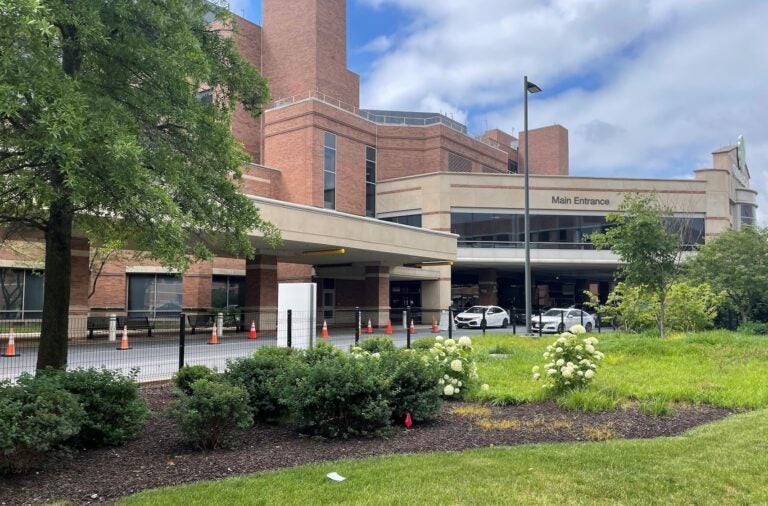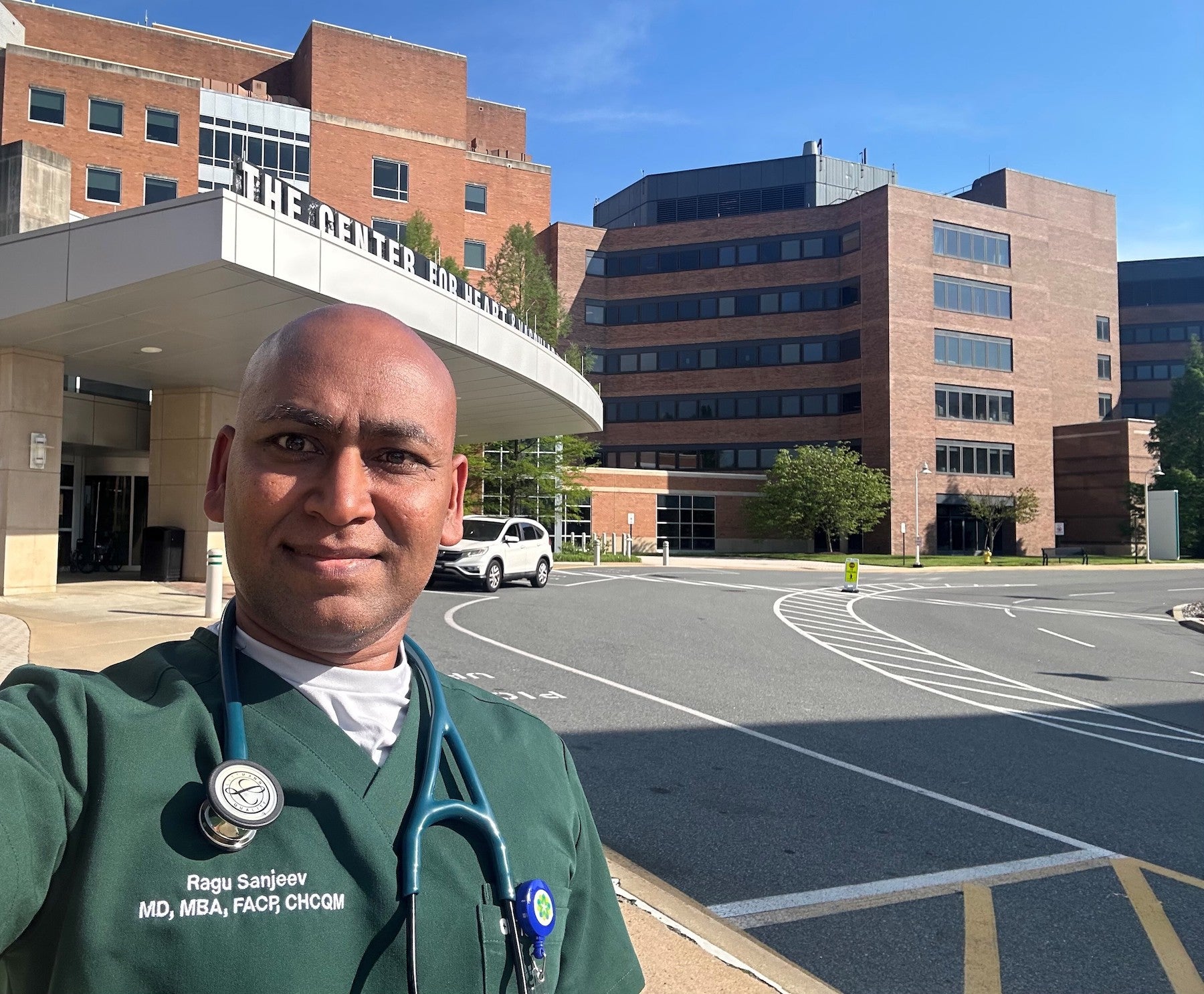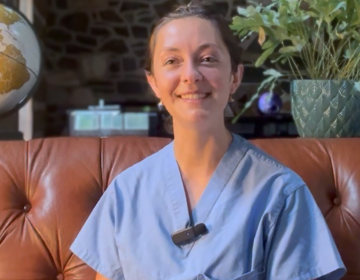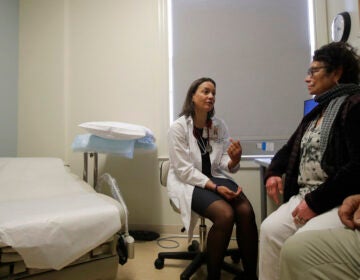Citing ‘burnout,’ doctors with ChristianaCare file papers to form system’s first labor union
Two-thirds of the more than 400 doctors on staff at the health system’s major Delaware operations, including Christiana and Wilmington hospitals, would be covered.
Listen 1:43
Doctors on staff at Christiana Hospital and other Christiana Care facilities in Delaware are seeking to unionize. (Cris Barrish/WHYY)
From Philly and the Pa. suburbs to South Jersey and Delaware, what would you like WHYY News to cover? Let us know!
Doctors employed by Delaware’s dominant medical system, ChristianaCare, have petitioned the National Labor Relations Board to vote on forming a union, WHYY News has learned.
Two-thirds of the more than 400 physicians who are on staff at the health care system’s main Delaware operations — Christiana and Wilmington hospitals, Helen F. Graham Cancer Center and the Middletown stand-alone emergency care center — signed cards seeking authorization to hold an election, union organizers said. The petition, which only required a 30% vote, was delivered to the NLRB office in Philadelphia late Tuesday.
The union would be the first in the 136-year history of ChristianaCare, Delaware’s largest private employer with about 11,600 staff members. Should the doctors elect to form a union, the next step would be collective bargaining on a contract to address duties, wages and other issues.
Dr. Ragu Sanjeev, a ChristianaCare internist and leader in the unionization effort, told WHYY News in an exclusive interview that he and his colleagues are taking the unprecedented step because physicians have been overworked to the point that many have left ChristianaCare, and that administrators have not addressed concerns about understaffing coming out of the pandemic.
“We have still not been able to staff up enough to where us physicians can get back to just focusing on taking care of patients,” Sanjeev said. “We all went to med school to primarily take good care of patients and keeping them healthy and getting them better once they get into the hospital, especially when they are at their sickest. And because of the hospital’s mismanagement of its employees, especially physicians, a lot of good doctors [who are] well-respected in the community have been leaving.

“There has not been a concerted effort, and even if they tried, they have not been able to recruit enough. However, the bleeding continues, which means people that are still here end up getting overworked even more. So basically we’re trying to fix all that.”
The hospital and emergency room doctors who could be part of a collective bargaining unit comprise about 3.5% of ChristianaCare’s Delaware workforce. The system’s physician assistants, nurses and other caregivers and staff, including contracted physicians or those who have visiting hours at the hospitals, are not part of the effort. Nor are the doctors at ChristianaCare’s other facilities and clinics in Delaware, Maryland and Pennsylvania.
It’s rare for doctors in private health care systems to unionize. The ChristianaCare group’s drive is being done in conjunction with the Doctors Council Service Employees International Union, which has helped about 4,000 doctors unionize at both private and public systems in Minnesota, Wisconsin, New York City, Chicago and elsewhere.
“By unionizing, physicians are at their strongest to provide the best possible care to their patients,” said Dr. Frances Quee, president of the Doctors Council group. “We are proud to stand with the ChristianaCare physicians as they approach this monumental election.”
The unionization drive comes as state lawmakers are pursuing legislation that would create a medical cost review board that could require hospitals to submit their budgets to board members. The House has passed the bill, which now awaits action in the Senate.
ChristianaCare responded to the petition with a statement issued to WHYY News by a spokesperson.
“At ChristianaCare, we are proud of our physicians, who deliver world-class care while serving our patients and our community with love and excellence. We believe that continuing to have a direct relationship with physicians is an essential component of our continued shared success,” the statement said. “We have received the petition from Doctors Council SEIU Local 10 MD and recognize the right of all employees to vote on whether or not they want a union to represent them.”
During the run-up to the petition submission, ChristianaCare leadership did try to dissuade its physicians from joining the effort, according to a memo from medical group president Dr. Lisa Maxwell that was obtained by WHYY News.
In Maxwell’s memo addressed to her “dear colleagues,” she wrote that while “I will always support each physician’s right to choose for themselves, I firmly believe a union would not be in the best interests of our physicians, patients and ChristianaCare as a whole.”
Maxwell wrote that “unions replace the voices of individuals with one collective voice — the union’s — which has its own set of objectives. Union bargaining is inherently slow and adversarial, dividing the organization between ‘labor’ and ‘management’ who negotiate through their union representatives. The results of that negotiation are completely unpredictable, and the terms in any final contact can go up or down or even stay the same after very lengthy negotiation time periods.”
Maxwell’s memo informed her physician subordinates that “a union would only represent physicians on matters related to pay, benefits and terms and conditions of employment” and that “decisions regarding patient care, organizational accountability and transparency, better operational systems, and employee value and growth are not required subjects for bargaining by unions under the National Labor Relations Act.”
Maxwell’s memo also said she “is listening” to doctors’ concerns, and that in recent years the system “fell short’’ while making unspecified changes to the work conditions.
Sanjeev countered that ChristianaCare has given lip service to listening in recent months. “We get double-speak, where they hear us but don’t listen to us and don’t have any really good solutions for this situation … We’ve reached the breaking point and we just need to organize and have a seat at the table and have our voices heard.”
Sanjeev said one change that has alienated physicians was the removal of paid time off from their compensation package. Instead, their salaries are based on 40 hours a week for 52 weeks and any vacation or other time off is uncompensated. They can recoup the money by working additional hours, he said.
“This only added more fuel to the burnout that we’ve been experiencing,’’ Sanjeev said.
Other issues of concern are what the union organizers call:
- The erosion of the physician-led model of care and the threat of corporate influence on medical decision-making.
- Limited input and decision-making power in matters affecting patient care, physician safety and professional autonomy.
- The moral injury caused by the pressure to prioritize productivity and profit over patient needs and values, and from a lack of support and resources to provide high-quality care.
Other doctors at ChristianaCare who support the effort echoed Sanjeev.
“What once felt like a partnership has evolved into an unhealthy dynamic, affecting our ability to deliver the compassionate care we all aspire to provide,” said Dr. Bryan Haimes, who specializes in pediatric emergency care.
“We’re at a tipping point,’’ said Dr. Gennadiy Ryklin, a hospitalist. “The majority of physicians across all the hospital specialties are saying the same thing: They don’t feel like they can safely take care of their patients anymore.”

Get daily updates from WHYY News!
WHYY is your source for fact-based, in-depth journalism and information. As a nonprofit organization, we rely on financial support from readers like you. Please give today.






